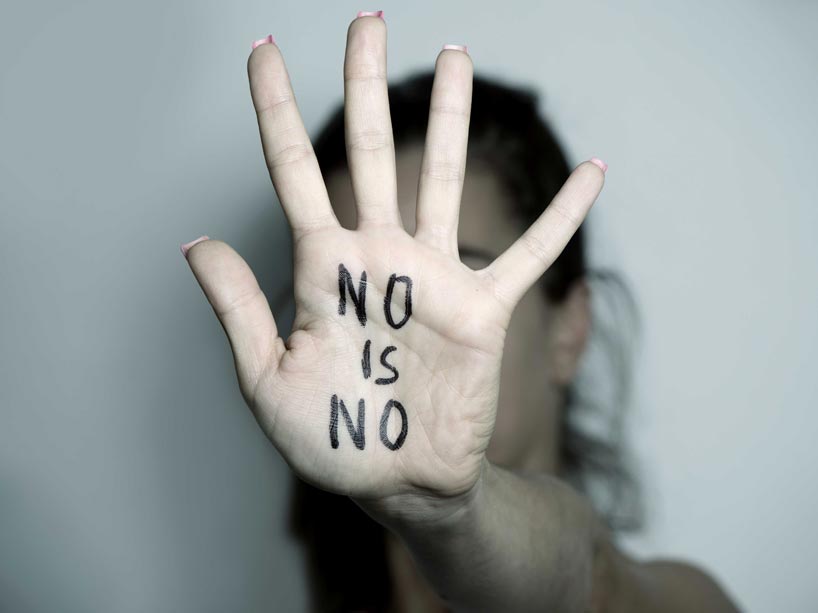Man in the mirror

Photo: Respecting no means no is one way to end gender-based violence.
“Be a man.” “Man up.” “Boys don’t cry.” “You play like a girl.”
These are some of the dominating messages often heard by young men. Messages that paint specific, limited pictures of what it means to be a man. A recent event at the Student Learning Centre – Masc Off: Talking Masculinity and Ending Gender-Based Violence – invited open discussion about consent, accountability and masculinity as a construct. Organized and supported by the Office of Sexual Violence Support and Education (OSVSE), Ryerson Aboriginal Student Services, Student Affairs and the Faculty of Engineering and Architectural Science, the event was a response to the #MeToo movement, #Movember and part of the international campaign, 16 Days of Activism Against Gender-Based Violence.
The panel included: Ian Campeau, Ojibwa, Anishinaabe from the Nipissing First Nation and co-founder/former member of A Tribe Called Red; Courtney Skye, Mohawk Turtle Clan, comedian and public policy analyst; Farrah Khan, manager, OSVSE; Shad, artist and host of Hip-Hop Evolution; and Tiq Milan, writer and trans rights advocate. The panel was moderated by Jennifer Hollett, head of news at Twitter Canada.
“I’m discovering the ideas of femininity and masculinity today seem to reinforce oppressive gender roles and hold power over people and maintain male supremacy,” Campeau said. “My dad would be considered a manly man. My mom tells a story where my dad wouldn’t let me get a Cabbage Patch doll that I wanted, he said that was for girls. My dad isn’t a bad guy – he was taught certain things growing up and just passed it on.”
Khan shared that she had a father who “cried a lot, he cooked and was the best cook in the house, and looked great in pink.” She also has four brothers and described growing up, her body and freedoms, like how she could dress or act, was policed by some of the men in her family.
As an Indigenous woman, Skye was taught that responsibility is central to ending gender-based violence.
“In our teachings, you are a self-regulating person who carries a responsibility,” she said. “Different people have different skills, and those responsibilities are carried out in different ways. Communities are reliant on those responsibilities.”
In light of the many sexual assault allegations that have rocked Hollywood as of late, Shad recognized that Harvey Weinstein, like many other men, may have internalized the expectation that being a man means “being successful and being ruthless in your pursuit of winning.”
“But if men internalize these things, how do they expect to be tender in their relationships?” Shad said. “In friendships between men, it shouldn’t be so hard to talk about the safety of women. It shouldn’t be complicated to hold friends accountable. But it is. It comes down to having a healthy relationship. It’s made me reflect on the quality of the male relationships in my life.”
As a self-identified transman, Milan had a unique perspective to offer.
“Growing up as a girl, I understood boyhood as freedom, being reckless and carefree, rather than being protected from the night, men and little boys,” Milan said. “When I developed my own expressions of masculinity, all my cues of what masculinity could be came from the queer community I had been a part of for over 20 years. But I also saw what masculinity was in the cis-male community but that’s not the kind of man I wanted to be. I wanted an organic type of masculinity that was tethered to who I am.”
Milan reminded the audience that gender doesn’t exist in a vacuum. Race and intersecting identities add layers to how gender oppression affects a person.
“For Black men, there’s an expectation of hardness and sexual prowess. Hip hop is a space where this specific image of Blackness dominates,” Shad said.
“The trajectory of hip hop has had this ebb and flow as part of its evolution. But what is the life imitating the art?” Milan said. “When we talk about gender-based violence it’s not just about how it affects women. It affects everyone. We have to start having conversations about misogyny. Real change happens when you push past the discomfort of having these uncomfortable conversations.”
Khan’s work with students at Ryerson includes conversations about dating and she says there remains a view of relationships between men and women as a conquest rather than a collaboration.
“Men need to understand women and femme folks as friends and humans with complicated experiences. And they must be given the space to say no. You are not entitled to anyone’s smile, time or consent,” Milan said. “Your masculinity isn’t tied to how much femininity you can control.”
Other events at Ryerson during the 16 Days of Activism Against Gender-Based Violence will include discussions of sex and power, and the annual memorial to honour lives lost to gender-based violence at the December 6th Memorial on the National Day of Remembrance and Action on Violence Against Women. Learn more at https://www.torontomu.ca/sexual-violence.